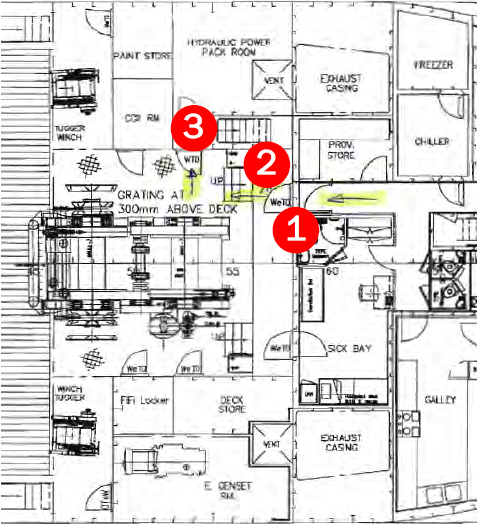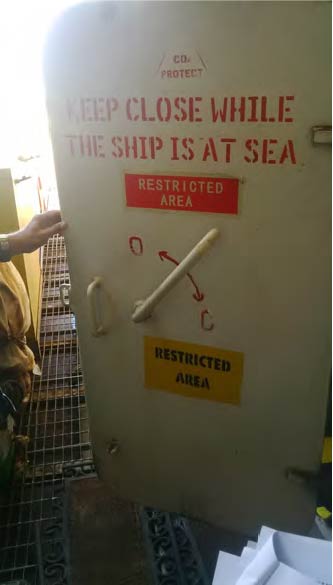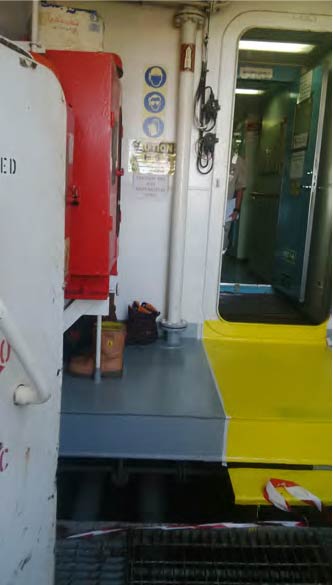Slip/trip resulting in lost time injury (LTI)
A member has reported an incident in which a crewman slipped on deck and fell, resulting in a broken arm. The incident occurred when the chief engineer was returning to the engine room from the bridge via the accommodation. In spite of instructions to stop personnel going on deck during heavy weather, the chief engineer decided to leave the accommodation in the winch housing area to return to the machinery spaces.

Outside, there was a small raised deck area, with two steps down to the main deck. The non-skid paint in this area was worn and as the chief engineer stepped out onto this area he slipped and fell forward. His fall and impact caused a fracture of his right upper arm. He received first aid treatment on-board, before being medevac’d ashore for further treatment.
The diagram to the right shows the injured persons path and incident cause. He left the accommodation via Position 1 into the winch housing area.
At Position 2, there was a small raised deck area, with two steps down to the main deck. Here he slipped and fell.
As he fell, he hit the watertight door in Position 3, which was secured open. This impact caused a fracture of his right arm.
Our member notes the following:
- That morning, the vessel Master had held a training brief on the bridge, advising all personnel of:
- hazards during heavy weather;
- the need to keep all external doors closed;
- restrictions on using external decks.
- The chief engineer misunderstood and/or chose to ignore the instructions in the briefing and the instructions painted on doors themselves (see image);

- Between the accommodation and the winch housing, the internal door was closed but the external, weathertight door remained open (see image);

- Between the winch housing into the machinery space stairwell, the external watertight door remained open;
- The raised deck and steps in this area did not have any non-skid painting or coating applied – this was known but had not been previously addressed;
- Despite the proactive briefing held, there was no requirement to conduct rounds and verify that all weathertight openings had been closed and secured;
- No-one exercised the stop work policy.
Our member suggested the following particular lessons:
- Remain proactive – particularly in unusual operational or working conditions;
- Go beyond checklists – Don’t be afraid to go above and beyond these requirements to further enhance safety;
- Safety briefing apply to all personnel – regardless of rank or role;
- Follow all warning signs – if a door says ‘keep closed at sea’, then keep it closed at sea regardless of previous practice;
- Particular care should be taken with maintaining watertight integrity and ensuring that all watertight doors remain closed at all times when at sea. Always stop work in unsafe conditions. If you encounter unsafe conditions, then stop the job and ensure all hazards are corrected before allowing anyone else to continue.
Members may wish to refer to IMCA Safety Flash 20/15 the focus of which is slips, trips and falls.
Safety Event
Published: 24 February 2016
Download: IMCA SF 05/16
IMCA Safety Flashes
Submit a Report
IMCA Safety Flashes summarise key safety matters and incidents, allowing lessons to be more easily learnt for the benefit of all. The effectiveness of the IMCA Safety Flash system depends on Members sharing information and so avoiding repeat incidents. Please consider adding safetyreports@imca-int.com to your internal distribution list for safety alerts or manually submitting information on incidents you consider may be relevant. All information is anonymised or sanitised, as appropriate.
IMCA’s store terms and conditions (https://www.imca-int.com/legal-notices/terms/) apply to all downloads from IMCA’s website, including this document.
IMCA makes every effort to ensure the accuracy and reliability of the data contained in the documents it publishes, but IMCA shall not be liable for any guidance and/or recommendation and/or statement herein contained. The information contained in this document does not fulfil or replace any individual’s or Member's legal, regulatory or other duties or obligations in respect of their operations. Individuals and Members remain solely responsible for the safe, lawful and proper conduct of their operations.
